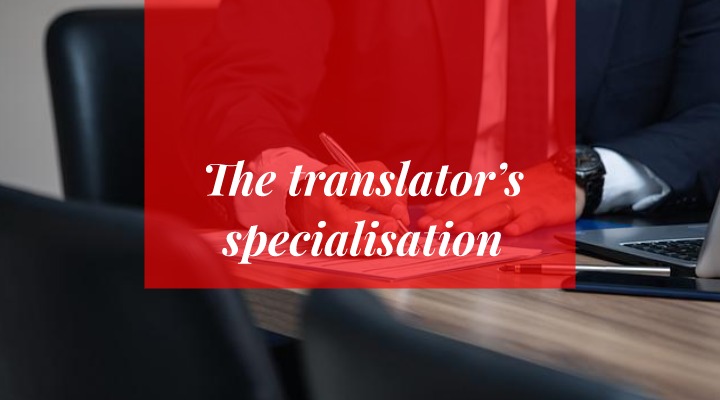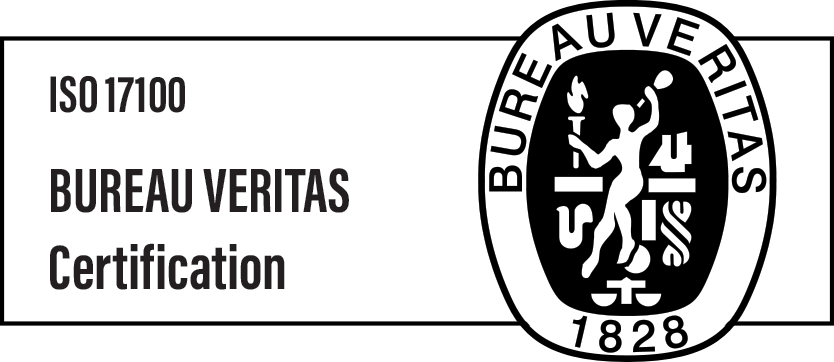Why is the translator’s specialisation important?

Why is the translator’s specialisation important?
A translator’s profession is very often associated only with the foreign language – if one can use it fluently, he or she should be able to transfer any kind of text from the source language into the target language. Unfortunately, this is not the case. Translation demands much more than just the knowledge of a given language. Of course, the ability to correctly use a language is also of high importance. Nevertheless, translation is a mixture of linguistics, culture, sensitivity to nuances and the awareness of specific vocabulary, phrasing and tone.
That is why it is so important for a translator to gain a specialisation. In the translation industry, one person can’t obtain the knowledge of every possible branch to such an extent that they can provide a high-quality translation.
There are a lot of reasons why a translator should decide on a specific specialisation. We should especially mention two of them – increasing the amount of information and competition. Nowadays, we can recognise many more areas and sectors in which a translator can specialise; more knowledge is to acquire and more facts to understand. By being a specialist in one specific area, a translator increases their chances of delivering the finest translations. Secondly, specialisation is necessary if the translator desires to be noticed and appreciated in the ever-growing competition.
When it comes to the translation industry, the idea of specialisation is not as crystal-clear as it is in other professions. It is not specified in any detail. In fact, the translator can specialise in any particular topic. There are, however, some areas which have always been important for the translation industry. In the following parts, we are going to discuss three types of specialisations in this industry: technical, medical and legal.
Technical translation
Translators specialising in technical translation need to have the knowledge and experience required to understand complicated and detailed documentation and plans. There is a wide range of different industries included in technical translation. While translating a technical document, the translator needs to be aware of specific terminology within a given topic. Moreover, it is essential that translators understand the processes described in the text. Here, accuracy is extremely important, as every single detail matters. Have a look at this article explaining how we deal with technical translation.
Medical translation
Specialisation covering medical and pharmaceutical areas has long been considered one of the most challenging. The purpose of this translation is not only to convey the information accurately and correctly but, more often than not, patients’ health or even life depends on it. The knowledge and skills of medical translators have to comprise much more than just excellent language abilities. To transfer these documents, insight into medical sciences is also required.
Medical translators, just like any other, have to be aware of their audience. There are situations in which it is not necessary to use excessive medical terminology. However, when it comes to academic papers or publications, all of the terms need to be transferred correctly and accurately. The medical translation covers much more than this; you can read about it in more detail here.
Legal translation
While technical and medical translations are said to be demanding in their complexity, legal specialisation seems to be out of this world. Translators who specialise in this type of translation have to know three languages – source, target and legal. Surely you have read a legal document at least once in your life, and you’ve noticed the peculiarity of this style; structures, terms and tone present in these texts are not frequently used in everyday situations.
This is because legal documents cannot leave any room for misunderstandings or omissions. Every single word may cost a lot – literally! Legal language is full of nuances and formal phrasings which need to be understood by the translator. Moreover, legal translators have to know a lot about different legal systems and possible loopholes. When it comes to legal translations, in most cases, it is required that they are conducted by a sworn translator – a translator who is allowed to interpret and translate documents in court or in other public institutions. Want to know more about this specialisation? You can find more information here!
As you can see, translation is not only limited to the language itself. It requires specialised knowledge of a particular area with all of its nuances, terminology and structures. That is why one translator cannot be able to prepare high-quality documents on technical, medical and legal issues at the same time. A translator needs to find their specialisation and constantly develop in it. The world is changing, and so is the translation industry. To provide first-rate translations, it is necessary to focus on one specific direction and use every possible opportunity to improve it.
At Aploq, we are well aware of the demands posed by the translation industry. For this reason, it is essential for our agency to cooperate only with professionals in their fields. We pay close attention to our clients’ satisfaction, which is why it is our first goal is to deliver high-quality translations that meet all the requirements of a given area.
If you want to know more about our work – drop us a line today!
Suggested read:

